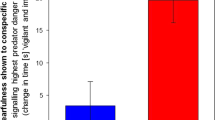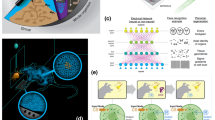Abstract
Animals commonly compete for resources by direct aggression: for example, spiders fight for web sites1, male red deer fight for females2, and scorpionflies fight for prey3. The application of game theory has considerably advanced our understanding of the evolution of such contests4,5,6,7. A general conclusion is that, if possible, animals should assess both the relative fighting abilities and the value of resources before making tactical decisions during contests8. These tactical decisions are assumed to be mediated by differing motivational state7,9, but this fundamental assumption has yet to be tested. Here we test the accumulated theory by probing the motivational state of hermit crabs during fights over the ownership of gastropod shells. The test uses a stimulus, novel to the crabs, that produces a startle response, the duration of which is an independent measure of the motivation to fight. We demonstrate that motivational state differs at an early stage of the contest according to the potential gain in resource value. There was no effect of relative size of the opponent on motivational state. In these contests, relative size neither predicted the likely cost of the contest nor the probability of victory.
This is a preview of subscription content, access via your institution
Access options
Subscribe to this journal
Receive 51 print issues and online access
$199.00 per year
only $3.90 per issue
Buy this article
- Purchase on Springer Link
- Instant access to full article PDF
Prices may be subject to local taxes which are calculated during checkout



Similar content being viewed by others
References
Riechert, S. E. Games spiders play, II. Resource assessment strategies. Behav. Ecol. Sociobiol. 6, 121–125 (1979).
Clutton-Brock, T. H., Albon, S. D., Gibson, R. M. & Guinness, F. E. The logical stag: Adaptive aspects of fighting in the red deer (Cervus elaphas L.). Anim. Behav. 27, 211–225 (1979).
Thornhill, R. Fighting and assessement in Harpo bitticus scorpionflies. Evolution 38, 204–214 (1984).
Maynard Smith, J. & Price, G. R. The logic of animal conflict. Nature 246, 15–18 (1973).
Maynard Smith, J. The theory of games and the evolution of animal conflict. J. Theor. Biol. 47, 209–221 (1974).
Parker, G. A. & Rubenstein, D. I. Role assessment, reserve strategy and acquisition of information in asymmetric animal contests. Anim. Behav. 29, 221–240 (1981).
Enquist, M. & Leimar, O. Evolution of fighting behaviour: decision rules and assessment of relative strength. J. Theor. Biol. 102, 387–410 (1983).
Parker, G. A. Assessment strategy and the evolution of fighting behaviour. J. Theor. Biol. 47, 223–243 (1974).
Parker, G. & Stuart, R. A. Animal behaviour as a strategy optimiser: evolution of resource assessment strategies and optimal emigration thresholds. Am. Nat. 110, 1055–1076 (1976).
Culshaw, A. D. & Broom, D. M. The imminence of behavioural change and the startle response of chicks. Behaviour 73, 64–76 (1980).
Sibly, R. & McCleery, R. H. The dominance boundary method of determining motivational state. Anim. Behav. 24, 108–124 (1976).
Maynard Smith, J. & Parker, G. A. The logic of asymmetric contests. Anim. Behav. 24, 159–175 (1974).
Moorehouse, J. E., Fosbrooke, I. H. M. & Ludlow, A. R. Stopping a walking locust with sound: an analysis of variation in behavioural threshold. Exp. Biol. 46, 193–201 (1987).
Jackson, N. W. & Elwood, R. W. Interrupting an assessment process to probe changes in motivational state. Anim. Behav. 39, 1068–1077 (1990).
Elwood, R. W., McClean, A. & Webb, L. The development of shell preferences by the hermit crab Pagurus bernhardus. Anim. Behav. 27, 940–946 (1978).
Elwood, R. W. Motivational change during resource assessment by hermit crabs. J. Exp. Mar. Biol. Ecol. 193, 41–55 (1995).
Hazlett, B. A. & Baron, L. C. Influence of shells on mating behaviour in the hermit crab Calcinus tibicen. Behav. Ecol. Sociobiol. 24, 369–376 (1989).
Elwood, R. W., Marks, N. & Dick, J. T. A. Consequences of shell-species preferences for female reproductive success in the hermit crab Pagurus bernhardus. Mar. Biol. 123, 431–434 (1995).
Dowds, B. M. & Elwood, R. W. Shell wars: assessment strategies and the timing of decisions in hermit crab shell fights. Behaviour 85, 1–24 (1983).
Elwood, R. W. & Glass, C. W. Negotiation or aggression during shell fights of the hermit crab Pagurus bernhardus? Anim. Behav. 29, 1239–1244 (1981).
Elwood, R. W. & Neil, S. J. Assessments and Decisions: A Study of Information Gathering by Hermit Crabs(Chapman & Hall, London, (1992).
Hazlett, B. A. Information transfer during shell exchange in the hermit crab Clibanarius antillensis. Anim. Behav. 35, 218–226 (1987).
Hazlett, B. A. Assessments during shell exchanges by the hermit crab Clibanarius vittatus: the complete negotiator. Anim. Behav. 51, 567–573 (1996).
Acknowledgements
We are grateful to the Association for the Study of Animal Behaviour for funding this work.
Author information
Authors and Affiliations
Corresponding author
Rights and permissions
About this article
Cite this article
Elwood, R., Wood, K., Gallagher, M. et al. Probing motivational state during agonistic encounters in animals. Nature 393, 66–68 (1998). https://doi.org/10.1038/29980
Received:
Accepted:
Issue Date:
DOI: https://doi.org/10.1038/29980
This article is cited by
-
Complex strategies: an integrative analysis of contests in Siamese fighting fish
BMC Zoology (2022)
-
Hermit crabs, shells, and sentience
Animal Cognition (2022)
-
Extrinsic stressors modulate resource evaluations: insights from territoriality under artificial noise
Frontiers in Zoology (2021)
-
Does mating experience of male house crickets affect their behavior to subsequent females and female choice?
Behavioral Ecology and Sociobiology (2012)
-
Prior residency advantage for Atlantic salmon in the wild: effects of habitat quality
Behavioral Ecology and Sociobiology (2011)
Comments
By submitting a comment you agree to abide by our Terms and Community Guidelines. If you find something abusive or that does not comply with our terms or guidelines please flag it as inappropriate.



